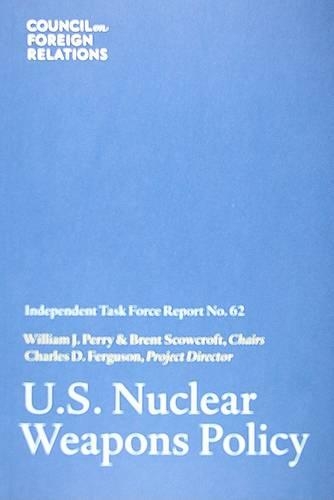
U.S. Nuclear Weapons Policy
(Paperback)
Publishing Details
U.S. Nuclear Weapons Policy
By (Author) William J. Perry
By (author) Brent Snowcroft
By (author) Charles D Ferguson
Council on Foreign Relations
Council on Foreign Relations
1st April 2009
United States
Classifications
General
Non Fiction
355.02170973
Physical Properties
Paperback
90
Description
In recent years, the dangers associated with nuclear weapons and the complexities of addressing these dangers have steadily grown. Relations with a nuclear-armed Russia could become adversarial. China's level of strategic development of nuclear technology remains unclear. Nuclear technologies are illicitly transferred through black markets. Equally important, new threats continue to grow from emerging nuclear states, such as Iran and North Korea, and from terrorist groups who may gain access to nuclear weapons. In this new and dangerous world, the United States must address and reassess its nuclear weapons policy. Under the leadership of former secretary of defense William J. Perry and former national security adviser Brent Scowcroft, an independent task force takes a fresh look at current U.S. nuclear doctrine and policy and determines the underlying purpose of America's nuclear weapons. Their report outlines a strategy for achieving the fundamental objectives of U.S. nuclear weapons through the skillful management of important political relationships and relevant amendments to policies on nonproliferation, arms control, nuclear terrorism prevention, securing nuclear weapons and weapons-usable materials, and ensuring crisis stability.
Author Bio
William J. Perry is the Michael and Barbara Berberian professor at Stanford University. He served as secretary of defense to President Bill Clinton. Brent Scowcroft is the resident trustee of the Forum for International Policy. He served as national security adviser to presidents Gerald Ford and George H.W. Bush. Charles D. Ferguson is the Philip D. Reed Senior Fellow for science and technology at the Council on Foreign Relations.
